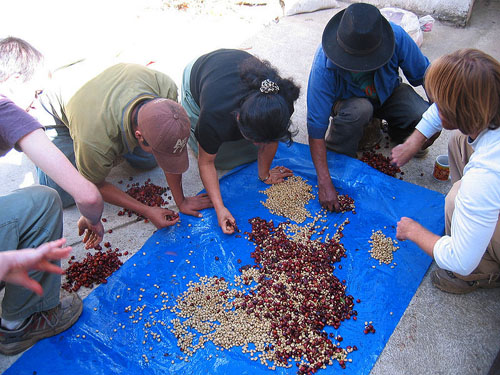Fair Trade Standards Aim for Minimum Wages and Collective Bargaining
It is not Clear that the Farmers Make any More Money and There is no Guarantee of Organic Produce
Copyright © Scott Roberts All Rights Reserved; content may not be copied, rewritten, or republished without author’s written permission;Posted December 20, 2011

 Fair trade is becoming an increasingly popular way to ensure that farmer cooperatives receive a fair price for their goods, which are usually agricultural crops. It also seeks to eliminate forced and child labor.
Fair trade is becoming an increasingly popular way to ensure that farmer cooperatives receive a fair price for their goods, which are usually agricultural crops. It also seeks to eliminate forced and child labor.
FLO-CERT is the company established to certify the cooperatives. Because these crops are more expensive than the non-certified when they come to market, it is important that the certification process is stringent. Presently, farmers in over 70 counties are participating.
Fair Trade Standards
In order to be certified, certain standards must be met. They are divided up into organizations, hired workers, and products. In the case of small organizations, all members work their own land using their family for labor most of the time. All members share profits equally and all have a vote in what transpires within the organization.
When hired workers are used, collective bargaining is allowed through the formation of trade unions. Wages must be at least the average in the region. Safety and health standards for workers must be maintained.
Product requirements are set up for individual crops (or mined gold), such as sugar cane, coffee, cereals, etc. In the case of coffee, how the beans are processed is spelled out. How contracts are written are also covered to ensure that the farmers and buyers are both protected.
Is This Green and Sustainable Farming
No; this is a common misconception. For example, herbicides are permitted but where they may be used is restricted in many cases. As mentioned above, each type of crop follows its own set of regulations.
For example, farmers in Nicaraguan were urged to change over to organic coffee. Although this resulted in a higher price per pound, but the net income was lower because of higher costs and lower yields. In other words, it was a wash. Only the end consumer benefited from a health standpoint.
Do the Farmers Really Benefit Financially?
It really depends on who you ask. Some say yes, some say no, but evidence can make the case in either direction. The problem is that there are so many factors involved in agricultural work — supply and demand, rain conditions, the price of oil, and the fickleness of the consumer.
Tom Clougherty of the Adam Smith Institute, went so far as to describe Fair Trade as little more than a marketing ploy. The Institute calculated that a mere 10% of the fair trade premium for a cup of coffee at a popular London chain goes to purchase fair trade coffee beans instead of standard beans.
Like global warming (or climate change currently since the warming theory is pretty well debunked at this point), it may sound good, but that doesn’t make it fact.
In view of all these factors, does it really make sense to spend the extra money to buy these goods? In my opinion, no. You would be better off spending the extra money to buy products that are clearly certified organic.
References:
More Recipes and Food Articles
- Organic Apple Sauce Recipe
- Spicy Baked Habanero Chicken Recipe
- Build a Raised Bed Vegetable Garden
- Should You Steer Clear of Genetically Modified Food?
- Understanding Nutrition Labels and Serving Size
Website © 2011 Kelly Smith; all rights reserved; content may not be copied, rewritten, or republished without written permission; Webmaster’s Google profile

